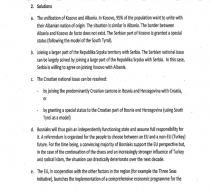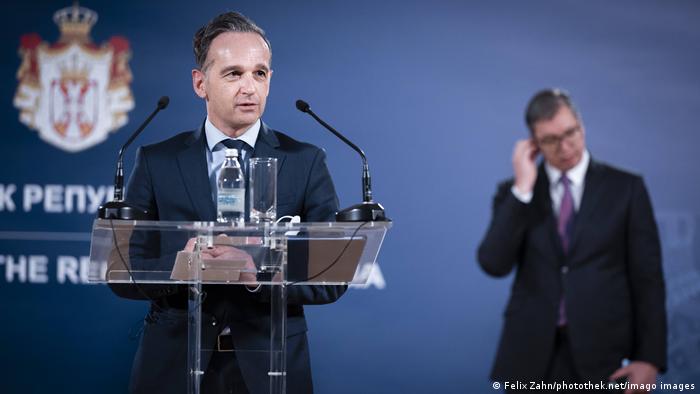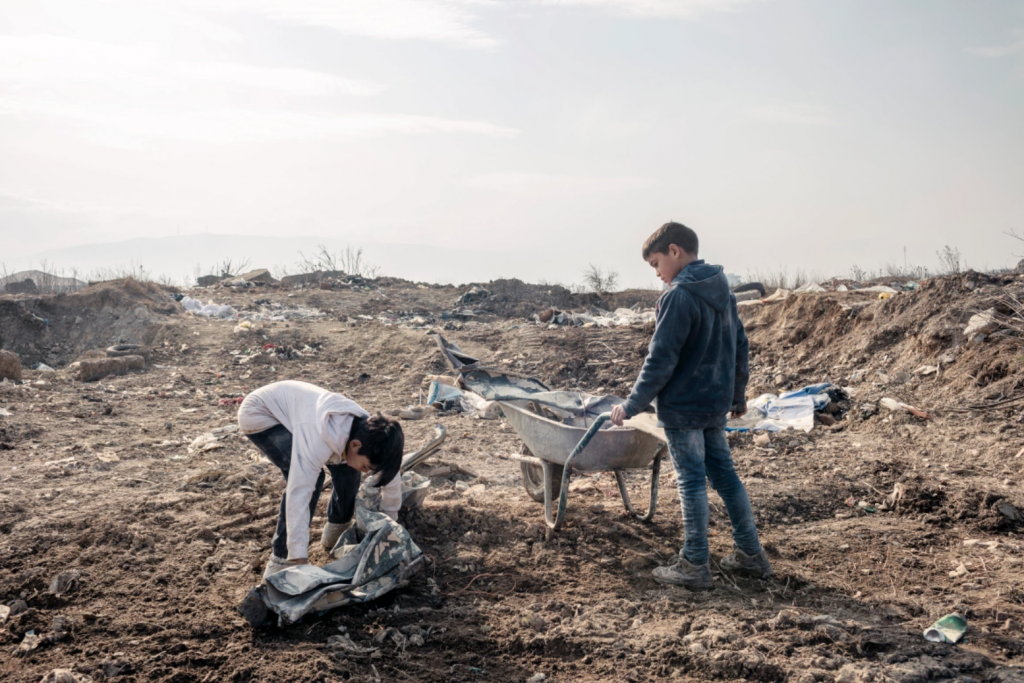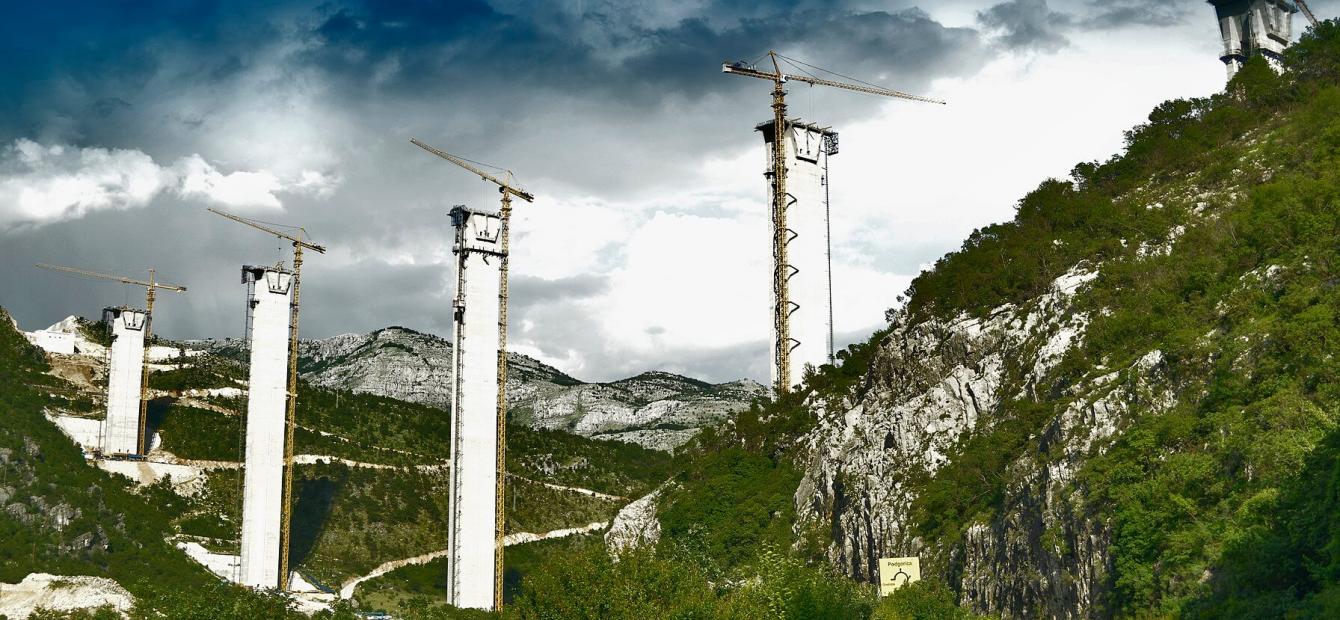Press Reviews
April 2021
International Media Digest
A FRAGILE REGION AND TWO NON-PAPERS
The strategic no man’s land
A recent non-paper on the future of the Western Balkans sparked controversy in the region and in Brussels. It suggests redrawing borders in accordance with ethnic balance, a perspective that blatantly contradicts the Western approach in south-eastern Europe, based on the respect of territorial integrity.
 Solutions unfolded in the document, posted by the investigative news website Necenzurirano, foresee a larger Serbia and a larger Croatia, while Bosnia and Herzegovina will be a smaller state where only Bosniaks (Muslims from Bosnia) live. Such theory reverberates the ultra-nationalist calls that paved the way to the violent breakup of Yugoslavia. In addition, the non-paper recommends the creation of a joint Albanian country.
Solutions unfolded in the document, posted by the investigative news website Necenzurirano, foresee a larger Serbia and a larger Croatia, while Bosnia and Herzegovina will be a smaller state where only Bosniaks (Muslims from Bosnia) live. Such theory reverberates the ultra-nationalist calls that paved the way to the violent breakup of Yugoslavia. In addition, the non-paper recommends the creation of a joint Albanian country.
Several media suppose that the non-paper comes from the office of the Slovenian Prime Minister Janez Jansa, whose country will hold the EU’s Presidency from the 1st of July. Yet Jansa denied any involvement. Necenzurirano remarks that the non-paper has been drawn up in various European capitals, Ljubljana and Budapest included. Since Jansa was appointed Prime Minister in March 2020, relations with Viktor Orban’s Hungary, with whom Jansa shares some very conservative values, have warmed up.
“Whoever wrote it, is touching on themes dear to right-wing populist circles all over Europe”, pointed out Tony Barber, Europe editor for the Financial Times, noting “the document has nothing to say about Russian or Chinese influence in the Western Balkans, whereas it makes three dark references to Turkey – whose presence is undoubtedly on the rise. It also complains about alleged radical Islam in Bosnia and Herzegovina”.
In his piece, Barber signalled that the region “has been trapped in a strategic no man’s land for a quarter of a century”, with the EU unable to integrate it. As a consequence, new uncertainties emerge. Nationalists from and outside the region speak loudly and new powers, “principally China, Russia, Turkey and the Gulf states”, try to “extend their influence in the EU’s backyard”.
Quoted by Radio Free Europe/Radio Liberty, also the analyst Toby Vogel, senior associate of the Democratization Policy Council (DPC), warns that the content of the non-paper, even though Brussels’ officials will never discuss it seriously, should not be underestimated. “I think it’s more of a trial balloon or a provocation maybe … But the question is, what’s the secondary effect this is going to have? … I think the effect it has is to create an atmosphere in which people feel that everything is negotiable – nothing is to be taken for granted. And that’s a very dangerous game to play, I think, in the Balkans”.
A “clever woman” behind the Serbia-Kosovo roadmap?
Another non-paper has circulated in Brussels in the last weeks. It concerns the Serbia–Kosovo dialogue. The Pristina-based newspaper Koha Ditore revealed the existence of the document which predicts that by 2022 the two countries “would recognise each other’s territorial integrity and sovereignty under an EU deal led by Germany and France”. Quoting the Kosovar newspaper, Euronews said that an “autonomous district of northern Kosovo would be created, while the Serbian Orthodox Church would have a privileged status”.
The Serbian President Aleksandar Vucic believes that a “clever woman”, a respected insider, wrote the non-paper. As for its content, he said that it contains “sections that would both please and horrify Serbs”. On his part, the Kosovar Prime Minister, Albin Kurti, refused to make any comment. Euronews, again, reported.
“France and Germany quickly denied they had written the non-paper. But they also did not rule out that such a non-paper may exist, which further increased speculation”, Radio Free Europe / Radio Liberty told.
EDI RAMA’S THIRD TERM
The Socialist Party (centre-left) won the general elections in Albania, held on April 25. For Edi Rama, it will be the third consecutive term as Prime Minister, a record in the country’s post-Communist era.
Pre-electoral opinion polls indicated that the socialists were ahead, yet their success is larger than expected. They took 48,68% of the votes, obtaining 74 seats out of 140, thus the absolute majority. The Democratic Party (centre-right), led by Lulzim Basha, gained 39,49% (59 seats), while the Socialist Movement for Integration (centre-left), founded by the President of the Republic, Ilir Meta, and headed by his wife, ended third with 6,81% (4 seats) – a big loss compared to previous elections. Basha and Meta’s parties struck a deal to form a post-vote coalition, if the Socialist Party had failed to get the majority.
The Social Democratic Party (centre-left) (2,25%) will be the fourth political group in the assembly, with three MPs.
“The focal point of the campaign was the clash of personalities between Rama, Basha and current President Ilir Meta … Rama accused his two rivals of having no policies, only an obsession with getting rid of him. They accused him of vote-rigging and corruption”, stressed Al Jazeera.
Two days before the vote, Meta made a TV speech blaming the US embassy for interfering with the electoral process to secure a third term for Rama. The American ambassador, Yuri Kim, firmly rejected such a view. For a country that proudly defines itself as the most pro-American nation in the Balkans, it was an unprecedented public conflict between the US embassy and an Albanian high official, Deutsche Welle pointed out.
While in previous electoral campaigns Rama had strongly advocated Albania’s European dream, this time he changed his tune, focusing more on national targets in fields like agriculture or tourism, where Albania plans to be the “the champion of the Balkans” in the next decade, as the Prime Minister said. He side-lined the Europeanization process, which is too slow, and vehemently criticized the EU for not having provided vaccines to the Balkan region.
Rama’s animosity with the EU might stem from the fact that throughout the last years Brussels has repeatedly criticized Tirana for its failure in consolidating the rule of law.
Yet Europe is still a lighthouse for Albania, which joined NATO in 2009. “A recent poll found that 97% of Albanians want the country to join the EU, making it one of the most pro-EU countries in the Western Balkans”, Euronews reported. As for the formal opening of EU accession talks, due to be announced in the coming months, the EU-funded network wrote: “Even if negotiations do begin, significant hurdles remain over key issues such as corruption, organised crime, and institutional reform”.
Further News and Views

Germany calls for normalization of Serbia–Kosovo ties
During an official visit to Belgrade, Germany’s Foreign Minister Heiko Maas called on Serbia and Kosovo to resume talks on normalizing bilateral relations. Maas, who together with Chancellor Angela Merkel has been committed to a viable solution to the Serbia–Kosovo controversy, pointed out that both countries now had governments with stable majorities, making it a propitious moment to restart talks.
Deutsche Welle, April 23

Vjosa Osmani – Stepping out onto the world stage
On April 4, the Kosovar Parliament elected Vjosa Osmani, 38, as the country’s President. She broke ties with the Democratic League of Kosovo to support the new Prime Minister Albin Kurti, whose anti-corruption party, Self-Determination, largely won the election in February. “Osmani’s elevation to the top office now offers the anti-establishment protest movement turned political party, a chance to reform and shape the new nation”.
Gulf News, April 9

EU to funnel COVID vaccines to Balkans after China, Russia shipments
Finally, EU countries have reached an agreement to distribute vaccines in the Western Balkans. “The EU move comes after China and Russia distributed millions of doses of their vaccines in the region, whose countries are candidates to join the EU, and months after the EU vaccine-sharing mechanism was set up”, Reuters reported. Over half a million COVID-19 shots are due to reach the Western Balkans by August “to challenge Chinese and Russian influence”.
Reuters, April 20

The perils of air pollution in North Macedonia
Air pollution, the single largest environmental health risk in Europe, is a problem that all the WB6 share. North Macedonia is one of the most affected countries, with a rate of premature deaths higher than the European average. Reasons span from emissions from the former socialist Yugoslav-era industries to the burning of outdoor waste and domestic heating.
Al Jazeera, April 21
Monthly Analysis
MONTENEGRO'S DEBT SAGA:
THE LESSON TO LEARN FOR THE EU

Montenegro has been struggling to contain the public debt throughout the years, but recently its level has become unsustainable, reaching 103% of GDP. The surge originates from a loan agreement between the previous Montenegrin government and Exim Bank, the major Chinese lender, to build the 41 km section of a highway connecting the strategic Adriatic port of Bar to the border with Serbia.
Despite being branded as largely unfavourable by experts, the contract, worth around 950 million dollars with a 2% annual interest, was approved by the Montenegrin government, dominated by Milo Djukanovic’s Democratic Party of Socialists. As expected, it has become a big burden for the tiny post-Yugoslav nation, that gained independence from Serbia in May 2006. The first payment of the loan is due to expire in July. If paid, the public debt will go up, jeopardizing the already fragile macroeconomic scenario. If unpaid, China will assume control over some of Montenegro’s lands, as stated by the contract.
The new Montenegrin civic-oriented coalition, that came to power after the August 2020 parliamentary elections, keeping the DPS in opposition for the first time since 1991, asked the EU for a loan to reduce Podgorica’s financial and geopolitical dependence on China. Brussels rejected the plea, saying that while it is committed to enhance democracy and economic growth in Montenegro, it cannot repay loans taken from third countries.
Brussels’ stance is legally logical. The EU has repeatedly discouraged countries of the Western Balkans to enter financial agreements with China, whose conditions are opaque. Hence, the refusal to assist Montenegro is a warning to the whole region. The message is clear: relying on European lenders such the European Investment Bank (EIB) and the European Bank for Reconstruction and Development (EBRD) is the only right choice.
However, dealing with Montenegro’s rising debt would make sense for the EU. On the one hand, it would be helping the 27-nation bloc to counter the Chinese influence in the region. On the other hand, the current Montenegrin government promised to improve democracy and restore the rule of law, damaged under the DPS tenure, as several independent observers have noted over the years. Since the recently revised EU enlargement strategy is centred on the rule of law proper, helping Montenegro’s new Government – that has to face an unpleasant debt legacy – would have been coherent with this new approach.
Beside this, the EU has a lesson to learn from Montenegro’s debt saga, not the only story of China’s increasing influence in the region: other countries, for other objectives, have asked Beijing for financial support. The fact is that the pace of the enlargement process is too slow. Thirty years have passed since the breakup of Yugoslavia and the end of communism in Albania. So far, just Slovenia and Croatia have joined the EU. Other nations are stuck in a limbo, both for local leaders’ reluctance to promote democratic reforms and the EU “enlargement fatigue”. If the EU does not find a new momentum to timely integrate the region, Russian and Chinese room for manoeuvre will become much wider.
The EU has contributed a lot to foster stability in the Western Balkans over the last thirty years. Nevertheless a geopolitical Union should understand when support to local allies should override mere accountancy rules: Greece, left alone, was induced to lend two terminals in the port of Piraeus to Chinese companies, allowing a strong commercial foothold to the detriment of ports owned by Mediterranean EU members.
The Insight Angle

MAJLINDA BREGU
Secretary General,
REGIONAL COOPERATION COUNCIL (Sarajevo)
Too often, international media depict the Western Balkans as a region plagued with rivalries, if not enmities, stemming from the traumas experienced in the nineties. Unfortunately, these dynamics are present. Yet, this is just one part of the story. Actually, there is a noticeable rate of cooperation among the WB6, with concrete results achieved in various fields. In this process, key to clearing the path to the EU, is the Regional Cooperation Council (RCC), a crucial steering body based in Sarajevo. We have talked to its Secretary General, Ms. Majlinda Bregu, to get a wider look at this side of the story.
Ms. Secretary General, how is the state of the art of regional cooperation in the Western Balkans?
At the beginning of the post-war period in the former Yugoslavia and the post-communist era in Albania, the region was mostly focussed on stabilization. It took years to accomplish this priority. Now, I see a sweeping awareness of the importance of regional cooperation. Over the last ten years we have increasingly realized that we, the countries of the Western Balkans, must join forces to give business communities and citizens better opportunities. Just to take an example, two years ago the agreement to remove roaming charges in the whole region entered into force, and as of this 1st of July 2021, the roaming in the Western Balkans will be zero; a measure highly appreciated by both citizens and entrepreneurs. Now we are working to get mutual recognition of diplomas. The RCC mission is building an agenda that serves people’s interests.
Has there been a specific accelerator speeding up regional cooperation?
More and more young, talented people have left the region over the last years. This phenomenon was a signal for the governments. It showed that citizens need policies oriented to improve their lives. One of their main needs, for instance, is having free movement across the region. Around 50% of the citizens of the WB6 cannot travel freely, visit each other or develop transnational business ties. They are burdens that we are trying to overcome. If we succeed, the scenario will improve dramatically, also in terms of women’s economic empowerment.
Free movement of people, goods and capital: these are the pillars of the recently adopted strategy for a Regional Common Market. How can the region benefit from it?
Leaders of the WB6 endorsed the Common Regional Market in November 2020. There is a clear roadmap, covering a period of four years, purposed to deepen economic integration and create a market of 18 million people, which is much better than having six small national markets. If implemented, the plan can help the region recover from the losses of the pandemic, raising the GDP by 6-7%. It is up to governments to make this agenda effective. As for the RCC, we coordinate the process and continue being committed to spreading the message that together we are stronger.
During the pandemic (and because of it), the RCC has launched an initiative to open borders, within the region and between the Western Balkans (WB) and the EU, to allow the flow of medicines, medical equipment and food. A test for the Regional Common Market, somehow. Has it delivered results?
When the pandemic broke out, daily problems across the borders – long queues, lengthy checks, truck drivers waiting for days – became even more unbearable due to new health rules and quarantine required. The establishment of the Green Corridors, agreed by the WB6 and the EU, is a success story that we managed to carry out, so that procedures across the borders will be smoother. Once more, this experience tells us that in times of crisis, whether it is a pandemic, an earthquake or big floods, we need each other.
Do you think that the EU can do more for the Western Balkans?
The Western Balkans are part of the European continent, not only because of geography. In fact, many people from the region have moved to EU countries to work. They contribute to their economies. I have always been a staunch supporter of the integration of the Western Balkans in the EU, and Brussels has an important role in the region, providing investments and stabilization. Furthermore, the European membership narrative is a lighthouse for pushing for reforms in our countries. Yet, I do think that the EU should do more to make the Western Balkans feel more involved in this story. Also, I believe that a renewed US–EU partnership can help the WB6 a lot. Whenever the transatlantic cooperation has been closer, the region has always moved forward.

Matteo Tacconi
Journalist and analyst, he covers the Balkans for a wide range of media networks. He worked as electoral observer for the OSCE/ODIHR in Albania, North Macedonia, Russia, Georgia and Ukraine.

